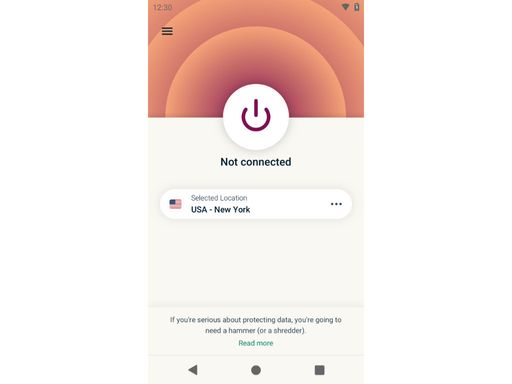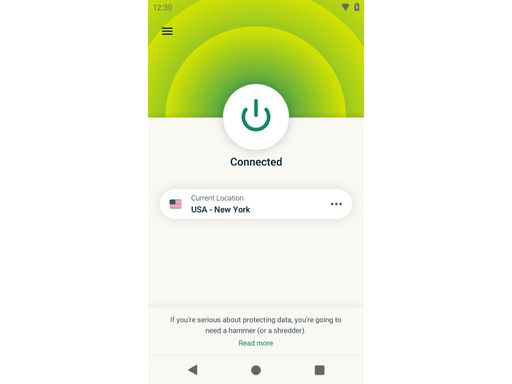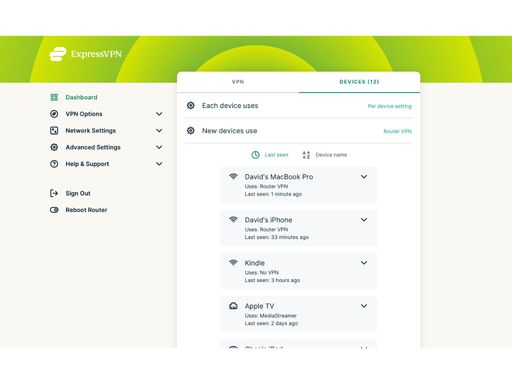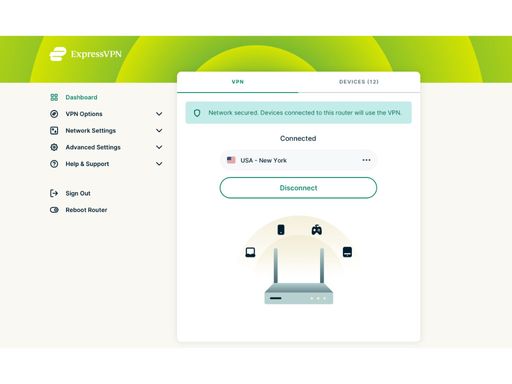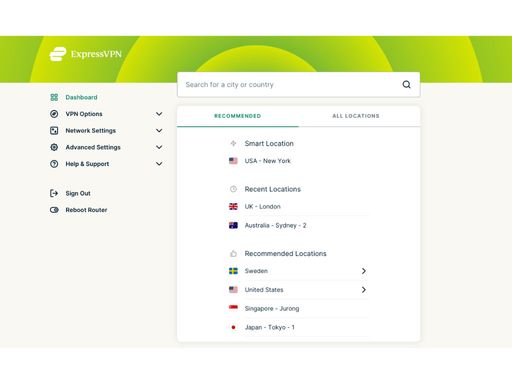
ExpressVPN Summary
ExpressVPN is our top rated VPN service. The desktop and mobile applications are very easy to configure and use. ExpressVPN has VPN servers in 94 countries, the highest number of countries available across the VPNs we have tested. ExpressVPN is more expensive than the other VPNs we have tested, but we found the stable connection and consistent performance outweighed the increased cost. There is nothing more frustrating than dropped connections or buffering streaming media. One negative is the limit of 5 simultaneous devices, which is very low. This may not be enough devices if you use a VPN on each of your devices rather than configure a VPN on your network router.
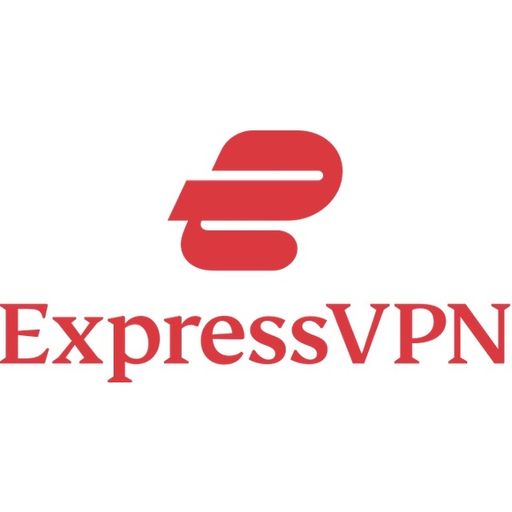
ExpressVPN is our favourite VPN for good reason. It offers a solid set of features, has one of the best performing VPN connections and supports a wide number of devices. It does cost more than most other VPN services, but we think that the additional cost is worth the extra investment.
- Has VPN servers in 94 countries, the highest we are aware of.
- Large number of supported devices.
- Simple and intuitive desktop and mobile applications.
- Consistent performance with minimal degradation when connecting to international VPN servers.
- Not the cheapest VPN service.
- Only supports 5 simultaneous devices which could be too low for many users.
- Dedicated IP address not available.
Summary
Reviewing VPN services is a somewhat tricky exercise. Most of the best VPN services offer pretty similar features, have comparable device support, and offer similar levels of performance and security. It is only if you have specific requirements for a VPN service, such as specific country support, device support or protocol support that you start to find clear winners and losers.
We will be reviewing what we consider to be the best VPN service you can currently get, ExpressVPN.
ExpressVPN Overview
ExpressVPN is our top-rated VPN service. The desktop and mobile applications are very easy to configure and use, and have a simple and intuitive interface. ExpressVPN has VPN servers in 94 countries, the highest number of countries available across the VPNs we have tested. However, ExpressVPN is significantly more expensive than the other VPNs tested, but we found the stable connection and consistent performance somewhat outweighed the increased cost. There is nothing more frustrating than dropped connections or buffering streaming media.
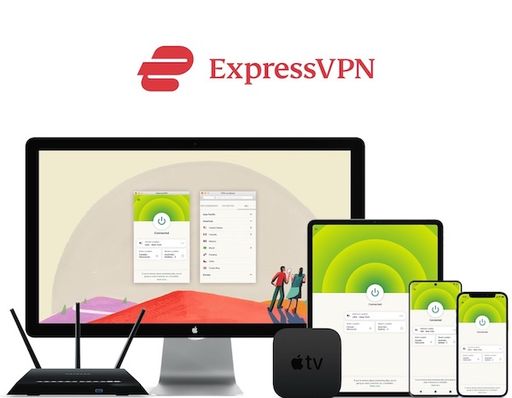
One negative that could be a deal-breaker for some is the limit of 5 simultaneous devices, which is very low. This may not be enough devices if you use a VPN on each of your devices rather than configure a VPN on your network router to cover your whole network.
What are the Benefits of a VPN Service?
There are several benefits of using a VPN on your computer, mobile device or router. Whilst I do not think that everyone needs a VPN, they can offer you a more secure and private Internet and web browsing experience, something that is becoming increasingly important.
Let’s look at a few ways a VPN service can help secure your Internet connection and improve your privacy.
Hiding your IP Address with a VPN
When your device connects to the Internet, your location is made available to the websites that you visit. For a mobile device, this may be the specific suburb you are located in and for your home Internet, it may be either your physical location or the location where your Internet Service Provider (ISP) connects to the Internet.
To see what location you are currently sharing, you can use an online service such as Where am I to check.
The geographic restriction is the primary technique that websites use to restrict content to a specific location. For example, the BBC iPlayer service in the UK restricts content to only UK residents. Commercially this is due to content developed by the BBC is funded by the UK TV licence fees that are paid by UK citizens.
A VPN can be used to circumvent such restrictions, allowing you to connect to a UK based VPN server and therefore appearing to the BBC iPlayer service as if you are located in the UK.
Enhancing your Privacy with a VPN
A VPN service can effectively make your Internet use anonymous. Every website you visit will log information to support both operational monitoring and contextual advertising and customising the experience to your specific profile. Some of this information can potentially be used to personally identify you and therefore you should be looking to minimise the footprint you leave across the Internet.
VPN services usually offer a no-log policy, providing a guarantee that they will not store or record any details about your use of the VPN service, including the data passed over the VPN or the websites that you visit. The issue is that such logs can be handed over to authorities upon request. Whilst there have been cases in the past of VPN services being caught logging such details, many are now audited by third parties to ensure compliance with this policy, publishing the results of the audits on their website.
- 2016, IPVanish provided user logs to the US Department of Homeland Security, even though at the time, they advertise as a no-logs VPN service. IPVanish is now owned by Stackpath who state that IPVanish does not log user activity.
- 2017, PureVPN handed over logs to the FBI. PureVPN completed a no-log audit in 2019 by Altius IT and another audit in 2020 by KPMG.
Accessing Blocked Websites with a VPN
A VPN allows you (in most cases) to access websites that have been blocked either by your local Internet Service Provider (ISP) or by government controls and restrictions. I say in most cases as the use of a VPN service is detectable, so the VPN connection can easily be blocked. This is a relatively rare scenario, but countries such as China, Turkey, UAE, and Iran are known for blocking most VPN connections when they are detected. Some countries, such as China are infamous for their use of the Great Firewall of China, where many western websites and services are blocked due to the lack of control the government has over the content that its citizens can view.
Is Using a VPN Service Legal?
Yes, using a VPN service is legal. However, a VPN can be associated with illegal activities, such as hacking, downloading pirated material or accessing the dark web.
Features
ExpressVPN offers a comprehensive feature set.
VPN No-log Policy
You can follow the following link to read the ExpressVPN no-log policy. It is comprehensive, well written, and easy to follow and understand.
VPN Split Tunnelling
ExpressVPN offers split-tunnelling as standard. This is an important feature if you are not thinking of using the VPN for all of your Internet traffic. Perhaps you only want to use a VPN for specific streaming services such as the BBC iPlayer, with your daily web surfing not needing to use a VPN. In this case, a split tunnel can be configured to only pass the streaming traffic over the VPN with all other Internet traffic using your local ISP. This can ensure that your Internet is not adversely slowed down due to the VPN connection. It is sort of a best of both worlds approach, where you get to choose the level of security and privacy applied to specific types of Internet use.
Internet Kill Switch
When there is an interruption to your Internet connection and you are connected using your VPN, an internet kill switch will immediately cut the internet connection. This ensures your activity remains anonymous and private.
We found the ExpressVPN to be instant and effective in killing your Internet connection when the VPN connection was interrupted.
Dedicated IP Address
ExpressVPN uses a shared IP address when they connect to the internet at a remote location. This is standard among most VPN services. Some VPNs (such as CyberGhost) offer an optional dedicated IP address for an additional monthly fee. The jury is still out on if this is a worthwhile feature. Check out the differences between a shared and a dedicated IP address here. Note that as this was written by CyberGhost there is some inherent bias. Note that NordVPN includes a dedicated IP address for free as part of their standard plan. You can see how NordVPN compares to other VPN services, including ExpressVPN in our Best VPN Service article.
Speed & Performance
Testing the speed and performance of a VPN is not always easy and straightforward. Several factors can impact the testing results, such as your local connection to your ISP, your ISP connections to the Internet, the VPN servers connection at the remote destination, and even the time of day the testing was performed.
ExpressVPN was an amazingly fast VPN service throughout our testing. We were surprised how little impact the VPN had on our download and upload bandwidth, and we were able to stream 4K video with little or no degradation in video performance.
VPN Performance Testing
To test the speed and performance of a VPN service, we used a desktop iMac from our Sydney location and connected it to VPN locations in Sydney, London and San Francisco. We connect to the Internet using a 50Mbps download 20Mbps upload broadband connection. On a typical day without connecting to a VPN, we would typically get 54Mbps download and 19Mbps upload speed. The Speedtest results are shown below.
To determine an overall speed & performance rating, we performed general web searching and streaming from Netflix, BBC iPlayer and Disney+ over several weeks to ensure consistency. For all Speedtest results, we took several results over the testing period at different times of the day. We then chose the result that represented the average.
All testing was performed using the latest Mac version of the native VPN desktop app. Any specific settings are called out below.
Baseline Performance Testing
For the baseline testing, we connected from our Sydney location to servers in Sydney, London and San Francisco.
Sydney
In this test we connected from our local desktop in Sydney to a Sydney server.
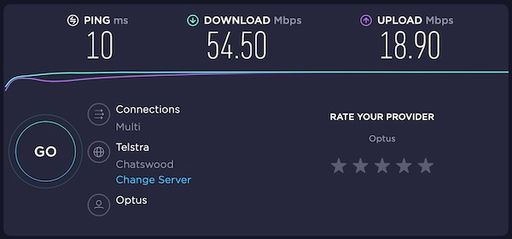
The results were pretty much as we expected based upon our 50Mbps download and 20Mbps upload broadband Internet connection. The low ping represents the proximity of our Sydney location to the Sydney servers.
London
In this test we connected from our local desktop in Sydney to a London server.
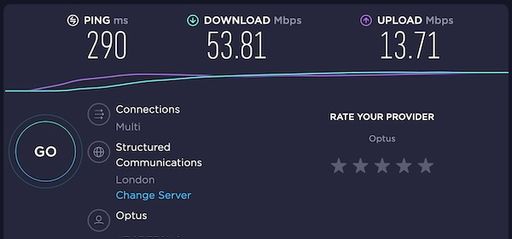
Both the download and upload bandwidth took a slight dip. The ping is noticeably larger due to the distance.
San Francisco
In this test we connected from our local desktop in Sydney to a San Francisco server.
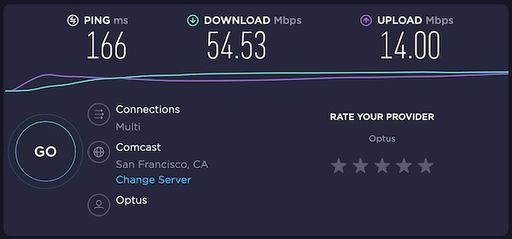
Both the download and upload bandwidth took a slight dip. The ping is larger due to the distance, but less than London. San Francisco is just over half the distance from Sydney as London is, so this seems a reasonable result.
ExpressVPN Performance Testing
For the ExpressVPN testing, we connected from our Sydney location to servers in Sydney, London and San Francisco. We enabled the Lightway protocol on the ExpressVPN desktop app, but all other settings were left as default. The VPN was connected to the location where we were performing the test, so if we were testing using London servers in Speedtest, we would also connect the VPN to the London ExpressVPN VPN servers. This represented a typical scenario where you may be connecting to London VPN servers to stream BBC iPlayer content that has been geo-restricted.
Sydney
In this test we connected from our local desktop in Sydney to a Sydney server with ExpressVPN enabled.
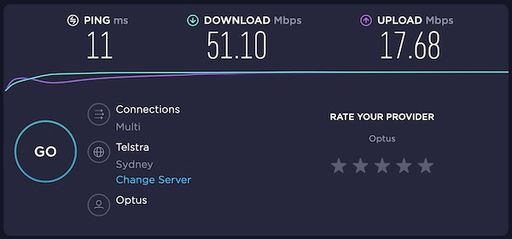
The results were pretty comparable with using no VPN and we did not notice any slowdown in connection performance. The connection remained very stable throughout testing, and we experienced no noticeable dropouts or disconnections. We felt that enabling the VPN 24 hours a day would not negatively impact our overall Internet experience.
London
In this test we connected from our local desktop in Sydney to a London server with ExpressVPN enabled.
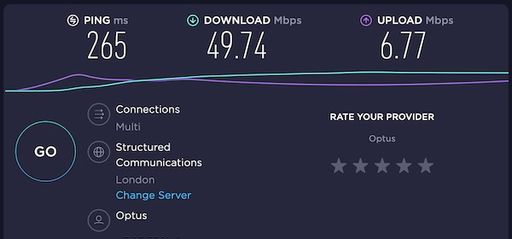
The results were pretty comparable with using no VPN and we did not notice any significant slowdowns in connection performance, with only the upload bandwidth being reduced. This became noticeable when our Mac started its regular cloud backup.
We also noticed that on many tests the ping time was even better than with no VPN! The average ping was only 265ms compared to a baseline of 290ms. This indicates that ExpressVPN is using a more efficient path to connect to London than our local ISP.
San Francisco
In this test we connected from our local desktop in Sydney to a San Francisco server with ExpressVPN enabled.
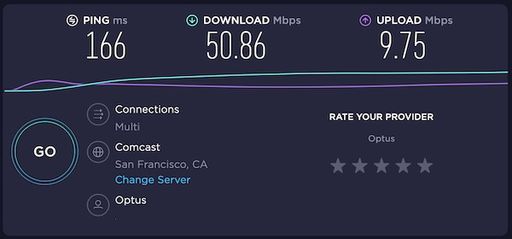
The results were pretty comparable with using no VPN and we did not notice any significant slowdown in connection performance, with only the upload bandwidth being reduced. This again became noticeable when our Mac started its regular cloud backup.
Security & Privacy
ExpressVPN supports the typical set of VPN protocols, including IKEv2, OpenVPN, L2TP, IPSec and PPTP. Note that ExpressVPN does not support WireGuard, a protocol that is becoming more popular and discussed.
As an alternative to WireGuard, ExpressVPN supports the Lightway protocol that was developed by ExpressVPN itself. We found that Lightway was faster than WireGuard when we tested CyberGhost, and recommend that you enable Lightway within the ExpressVPN app.
Geographic Coverage
ExpressVPN covers 94 countries. You can see a full list of supported countries on their respective websites.
We typically ignore the number of servers advertised. We have no way of knowing the capacity of the servers, so you cannot determine that a higher number is better. Private Internet Access has over 33,000 servers, but we found the performance on par with others tested.
Device Support
ExpressVPN has a very impressive list of supported devices.
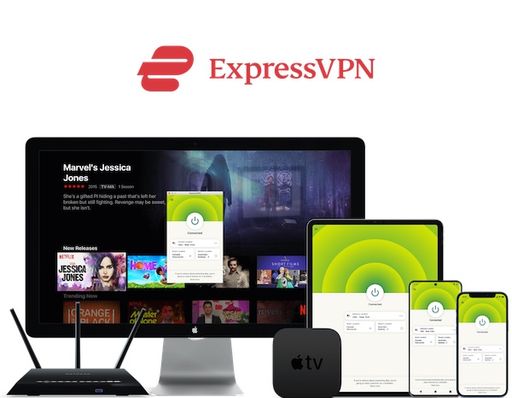
Desktop and Mobile Support
ExpressVPN has support for most desktop and mobile devices. This includes Mac, Windows, Linux, iPhone, iPad and Android devices.
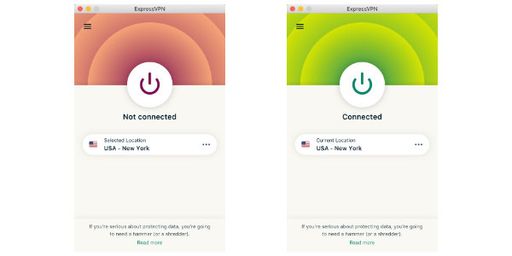
We tested the iPhone, iPad and Mac applications. All were easy to configure and use. The iPad app is more of an expanded iPhone app and does not make as good use of the screen size as it could, especially on the larger 12.9 inch iPad we were using.
Linux support is also very good, with a comprehensive set of command-line tools to configure and manage the VPN connection. We tested Linux support in an Ubuntu virtual machine.
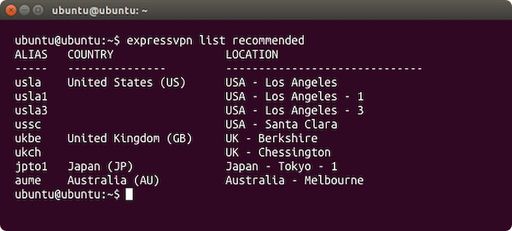
One thing worth noting is that we found potential side effects when using a VPN. For example, every time we enabled the VPN on our Mac, we would receive an email from Microsoft titled “Microsoft account unusual sign-in activity”. This is due to the Apple Mail app regularly checking against the Microsoft servers for new email, and when we enabled the VPN our location suddenly changed to the location of the VPN server. In some cases, this meant that our location instantly changed from Sydney to London or San Francisco. Microsoft looks at this as suspicious activity and therefore restricted our account until we verified that the activity was ours. This is a real pain and we would have to close Apple Mail before enabling the VPN. This is not limited to ExpressVPN and we encountered this issue with all VPNs we tested.
Router Support
ExpressVPN has comprehensive support for network routers and we were impressed by the wide range of support they offer. You have the option of either purchasing a recommended router (either through ExpressVPN or Amazon) or manually configuring your existing router.
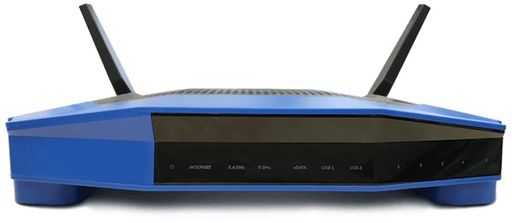
Recommended Routers
The following routers are recommended by ExpressVPN. If you purchase through ExpressVPN, they come preinstalled with ExpressVPN. Note that ExpressVPN uses FlashRouters to configure and ship the router.
- Linksys WRT3200ACM
- Netgear R6400v2
- Netgear R7000
Supported Routers
ExpressVPN also provides setup guides for the following routers. Note that if you have a router that was supplied by your Internet Service Provider (ISP), they are typically locked to restrict access to the more advanced configuration options such as setting up a VPN.
- Asus RT-AC56(U/R/S)
- Asus RT-AC68U
- Asus RT-AC87U
- Linksys EA6200
- Linksys WRT1200AC
- Linksys WRT1900AC(S)
- Linksys WRT3200ACM
- Linksys WRT32X
- Netgear R6300v2
- Netgear R6400v2
- Netgear Nighthawk R7000
- Netgear Nighthawk R7000P
They also provide instructions for you to manually configure the VPN for several other router manufacturers. We successfully configured our ASUS TUF AX3000 router by following the more general ASUS instructions.
- Asus (other models not explicitly listed above)
- D-Link
- DD-WRT
- Netduma
- Sabai
- Tomato
- TP-Link
- Xiaomi
Note that in many cases you will not be able to achieve the same level of security or privacy as using the ExpressVPN application on a supported router. For example, the ExpressVPN application for the ASUS RT-AC68U router supports all ExpressVPN security and privacy features. When we configured our ASUS TUF AX3000 router we were only able to use the OpenVPN protocol which does not offer the same level of security, privacy or performance as when using alternative protocols with the ExpressVPN application. It is for this reason that if you are considering using a VPN or your network router, you should use either a recommended or supported router rather than attempt manual configuration as we think there are too many restrictions.
You can find more details about router support at the ExpressVPN router page.
Set-top Box and Smart TV Support
ExpressVPN has support for Apple TV, Android TV, Amazon Fire TV, Roku and also typical Smart TV devices, such as Sony and Samsung.
It is worth noting that you do not always get the same level of VPN functionality across all supported devices. For example, even though ExpressVPN advertises support for Apple TV, you need to leverage the third-party MediaStreamer service. The following is stated on the ExpressVPN website.
This is a workaround so they can list support for such a wide range of devices rather than offering native application support. You should consider the implications of this if you are looking for specific device support and any reduction in your security or privacy as a result. Alternatives, in this case, would be to use the native ExpressVPN application on an iPhone, iPad or Mac and use AirPlay to stream media to the Apple TV, or leverage the ExpressVPN support of network routers to secure your whole network.
Gaming Console Support
ExpressVPN has support for Microsoft Xbox, Sony Playstation, and Nintendo Switch gaming consoles. As described above, support for gaming consoles will leverage the third-party MediaStreamer service.
Web Browser Support
ExpressVPN has plugins for Google Chrome, Firefox, and Microsoft Edge web browsers.
Simultaneous Devices
ExpressVPN is limited to only 5 simultaneous devices. We think that even 5 could be too low with the number of connected devices we have today. There also does not appear to be a way of increasing this, so you will need to determine your current needs and also your projected needs, especially if you sign up for a yearly plan.
We would like ExpressVPN to consider increasing this, as it is currently the lowest of all VPNs we have tested. In a typical household with a couple of desktop computers, an iPad and 2 phones, you have already reached your limit of 5 devices. An alternative is to configure ExpressVPN on your network router, but this is not always possible if you have an ISP supplied router, that is typically locked down from making advanced configuration changes.
Technical Support
We found ExpressVPN to offer good levels of support, both through the articles and tutorials on their website, and when we directly contacted their customer support.
Cost
ExpressVPN is an expensive VPN service, and even if you prepay for a 12-month plan, it still works out 4 times the price of our second-ranked VPN, CyberGhost.
ExpressVPN are offering Tech Review Ninja readers discounts across all VPN plans.
ExpressVPN Costs
ExpressVPN is expensive and is the most expensive VPN we have tested. It does make up for its high cost somewhat by great device support and impressive performance, but we are not convinced it represents the best value for money.
ExpressVPN is cheaper if you subscribe to their 12-month plan, but you will need to prepay for the full 12 months. They do offer a 30-day money-back guarantee if you are not satisfied.
Note that ExpressVPN only supports billing in USD. We would have preferred to be shown the pricing and be able to pay in local currency.
- 1 Month USD 12.95
- 6 Months USD 9.99
- 12 Months USD 8.32
You can pay using a credit card, PayPal, Bitcoin, or from several less common payment options such as Klarna, Mint and UnionPay.
Final Thoughts
We rated ExpressVPN the highest in our testing due to its fantastic features, superior performance and great device support. However, it is the most expensive VPN we have tested, and even if you subscribe to the annual plan it can work out significantly more expensive than others we tested. We think it can be worth the extra cost, but it is something you should seriously consider. Our second place CyberGhost can work out over 4 times cheaper than ExpressVPN and still provides a great VPN service. If the cost is a deciding factor we would not hesitate to recommend CyberGhost.
ExpressVPN are offering Tech Review Ninja readers discounts across all VPN plans.

